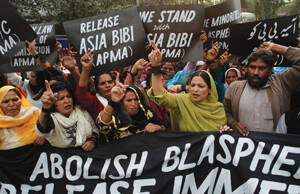Structural discrimination and a steady increase in violence against religious minorities in Pakistan are creating a system of two-tiered citizenship, one for Muslims and one for non-Muslims, according to a new report from an Islamic research center. The study, A Question of Faith, published by the Jinnah Institute in Pakistan, finds that Christians are the primary targets of religious persecution in Pakistan and reviews two critical questions confronting Pakistani society: will the state continue to discriminate against its citizens and “turn a blind eye to the spread of cultures of cruelty and vigilantism,” and will the majority of Pakistanis “condone and collude in the discrimination and persecution of minorities”?
Jinnah’s researchers say recent attacks on religious minorities and the state’s tolerance of this persecution are part of “a longer-term pattern of state complicity at all levels—judicial, executive and legislative—in the persecution of and discrimination against minorities.”
The report was warmly welcomed by the Rev. Mario Rodrigues, director of the Pontifical Mission Societies in Pakistan. Father Rodrigues said he was encouraged to learn that an institution that represents the Muslim intelligentsia in Pakistan was willing to highlight discrimination against religious minorities. “We know that Sherry Rehman [a member of Parliament and chair of the center] risks her life because she exposes herself on such delicate issues,” Father Rodrigues said. “We thank her and express our full solidarity.” He added, “I do not think, however, that the government will seriously address the question of religious minorities’ status. But this report gives us hope that something is moving in the public and civil society of Pakistan.”
A Question of Faith documents the progressive deterioration of the social and economic status of religious minorities and the increasing violence against them. Reviewing the subordinate status of Christians, Hindus and Ahmadis, it notes in particular that “the condition of Christians has deteriorated significantly.” In rural areas, researchers found, Christians are particularly vulnerable to oppression by wealthy Muslims.
“If this situation is to change,” the report’s authors conclude, “transformative corrective action has to be taken by the Pakistani state to encourage and nurture an inclusive and equitable Pakistani identity.” The report recommends “a model of citizenship that can incorporate group identities and the fundamental rights of individual citizens in light of international law and good practice.”
The findings of the report indicate that despite their persecution, religious minorities still connect strongly with a Pakistani national identity. The report also notes that Pakistan will likely be unable to control the violent extremism of groups like the Taliban unless it resolves its sectarian tensions, which it describes as a critical national security issue. The Jinnah researchers argue, “Fighting extremism is not just about militarily defeating the Taliban, but about departing from the sectarian ideology and oppressive legal frameworks that embolden militants.”
The report offers 23 recommendations for the government of Pakistan, including abolishing or substantially modifying the controversial blasphemy law to prevent abuses in its application, the approval of new articles of the Pakistan penal code to punish those who incite religious hatred or violence, confronting the impunity guaranteed to Muslim leaders who preach in mosques and reforming the police and the judiciary systems. The report calls on the government to review the system of Islamic courts and to establish a new independent authority, that of special ombudsman, modeled on the defenders of citizens’ rights common in the European Union.








